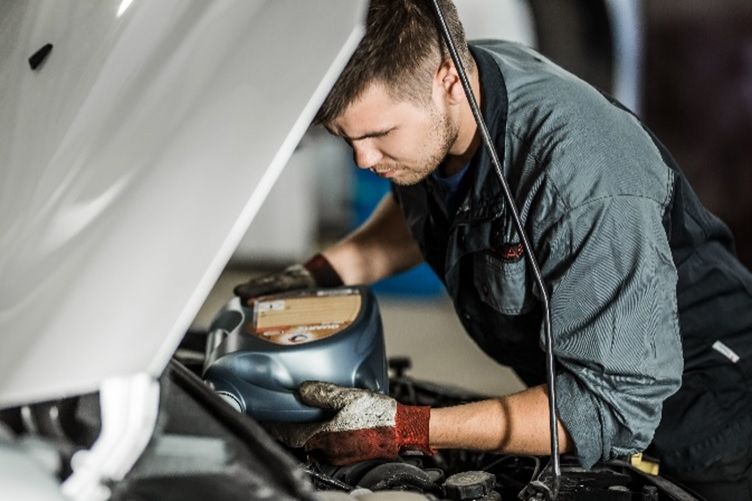
Yearly maintenance
We determine individually for each vehicle the maintenance work scheduled for the vehicle by the manufacturer, considering the mileage of each vehicle.
Situations necessitating yearly maintenance:
- Vehicle mileage has exceeded a certain figure or an annual inspection must be performed;
- Car service indicator lights up on the dashboard;
- You have purchased a used vehicle, but are unsure when the last service was performed;
- You want to increase engine life;
- Preparations for a longer car-ride.
During maintenance, among other things, we check:
- Suspension, brake system, exhaust system, etc., more information on this can be found in the Suspension Testing chapter;
- Leakage of technical fluids (visual inspection);
- Window cleaning system;
- Freezing temperature of the coolant;
- Headlight bulbs / if need be, we replace these;
- Humidity of brake fluid.
For a fee we can also perform the following works:
- Fire extinguisher inspection, 5€
- Brake cleaning and maintenance, 1 workhour
- Headlight adjustment, 20€
- Oil inspection in transmission system, power steering, gearbox, differential (hourly fee)
- Detection and deletion of faults in electronic systems, 25€
Annual maintenance is required for proper operation of the vehicle. The maintenance procedures are described in the car's manual, service book, and can also be obtained from an authorized car dealer. Nonetheless, we recommend that you carry out vehicle-related maintenance more frequently than is specified in the documentation, i.e. every 10,000 to 15,000 km. The longer the car's mileage, the more the oils in the car lose their properties, engine parts wear out and engine life is shortened. As a result, it is possible that the cost of repairing the engine can get very high in case of a malfunction. Don't be afraid to change the oil more often, this will save your engine.
Maintenance interval for almost all vehicles:
- Every 10-15,000 km (minor maintenance) – change of engine oil and oil filter, at least once a year, also if the car has not been used.
- Every 30,000 km – in addition to minor maintenance, cabin filter, engine air filter and fuel filter must be replaced.
- Every 45,000 km – minor maintenance.
- Every 60,000 km (incl. service performed every 30,000 km) – in addition to maintenance works performed every 30,000 km, the oil in the automatic gearbox alongside with the oil filter must be changed (even if the manufacturer has stated that the oil in the gearbox will last for the life of the gearbox).
- For petrol engines:
- Replace spark plugs, flush throttle valve and adjust valve settings (applies even for latest car models, but not for all car brands).
- For diesel engines:
- Check the operation of the spark plug system, preferably replace them, to avoid problems starting the engine in wintery conditions.
- Every 75,000 km – minor maintenance.
- Every 90,000 km (incl. service performed every 30,000 km) – in addition oil in manual gearbox, transmission and differential must be changed.
- Once every two years or every 30,000 km (in case of high mileage) – change brake oil.
- Once every five years or every 90,000 km (in case of high mileage) – change coolant.
- For SUVs with interfaces to lubricate universal joints, crossbars, ball joints, etc., we recommend changing the lubricants every 5000 to 15,000 km, depending on how the vehicle is being used.
- Power steering fluid must be changed every 60,000 km.
About filters – these may seem trivial, but every coin has two sides.
Oil filter filters the oil in the car so that clean oil, free of solid particles, could be injected into the engine without damaging the engine itself. Clogging of the filter means that oil cannot reach the engine, leading to shortage of oil in the engine, which in turn leads to higher engine wear and the resulting jamming of the same engine parts.
Air filter filters the air entering the engine. In a situation where clean air cannot enter the engine, the fuel in the engine's brain begins to change - this results in higher fuel consumption and in more air intake from the crankcase ventilation. If the crankcase valve is not working, oil from the engine will enter the engine, destroying the engine and exhaust system more quickly in the process. Dirty air can also cause the air meter to malfunction - however, all the faults described will result in additional financial costs.
Fuel filter filters fuel from the fuel tank into the engine. Load on the fuel pumps is increased with the filter becoming more and more dirty – this leads to a shorter service life of the fuel pumps. In case, dirt or sand passes through the filters, the material will immediately damage the fuel injectors of the engine fuel pump.
Cabin filter filters air entering the cabin. This air is inhaled by passengers inside the vehicle. Over time, as the filter collects more dust, leaves and moisture, all accumulated material may become mouldy, resulting in microbes entering the cabin. As the load increases on interior fans, the service life of those fans decreases. If leaves enter the fan, this poses a risk of fire or a risk of the engine stalling, leading to overheating of the engine and a fire in the cabin.
 English
English
 Eesti
Eesti Русский
Русский